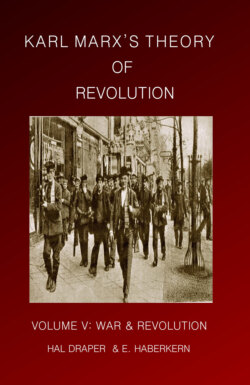Читать книгу Karl Marx’s Theory of Revolution Vol V - Hal Draper - Страница 10
На сайте Литреса книга снята с продажи.
4. “No Other Question Could Have Been Posed”
ОглавлениеEqually unfounded is Lenin’s assertion that, for Marx and Engels, “no other question could have been posed.” It is true that Lenin does not explicitly attribute this formula to Marx and Engels but the drift of his argument implies, indeed requires, such an attribution. It is Lenin’s apologia for Marx and Engels’ reputed prewar politics. But Marx and Engels never asked themselves this question. As early as the Crimean crisis of 1853, they expected the conflict between the old regime and the new to lead to revolution; a continuing revolution in which the working class would soon come to power. Given this perspective, it would have made no sense, in most cases, to support one government against the other. Marx and Engels’ hopes and expectations were not fulfilled as we know. The process of modernization and bourgeoisification eroded the position of the old ruling classes in Europe to the point where medieval relics like absolute monarchy became hollow shells. But this happened without a revolutionary confrontation. There were plenty of pre-revolutionary crises, but a compromise was always found short of a final conflict.
In this sense, Lenin was right. His schema better reflected what had happened. Marx and Engels, however, were writing in the midst of events. Maybe they should have realized that their expectations for revolution were premature and adopted a policy of supporting the “lesser evil” as Potresov maintained. But it is hard to imagine men of their temperament (or Lenin’s temperament) taking such a contemplative and disinterested view of political events. It would have required them to remain politically passive in one crisis after another because, as we now know and as Lenin knew, none of these crises would actually lead to revolution. But this is something they could not have known. They would have been acting like a trade unionist who, after soberly evaluating the “objective” situation, concludes that the strike cannot win and goes back to work. And, in doing so, helps to defeat the strike.
If Marx and Engels, and other socialists, had taken this passive attitude the socialist movement of the late nineteenth and early twentieth century would never have come into being. Without defeats and partial victories no final victory is possible. Or, as Luxemburg put it, “every revolution is bound to be defeated except the last.”12
A second problem with this schema is that even the vaguer formulation used by Potresov and Kautsky—“the success of which side is more desirable”—has nothing to do with Marx and Engels. If we were to make explicit the criterion they used in analyzing the wars in question—something they did not do—it would have to be “how can revolutionaries best exploit this conflict.” In the cases examined by Potresov and Kautsky, the record shows that Marx and Engels did not advocate support for either side even when they thought the victory of one side would facilitate revolution. Potresov clearly wishes Marx and Engels had preceded him in advocating a prowar position. Kautsky would have liked them to have reluctantly abstained from political opposition as he did throughout most of World War I. Unfortunately, for people looking for such precedents, Marx and Engels in the instances cited energetically denounced both sides and used what means were available to them to rally the organized working class against support for either side.
